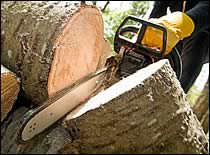 Today is Saturday, and I spent a good chunk of the morning out in the woods cutting firewood. Armed only with a chainsaw, I took down a couple of good sized but decidedly dead honey locust trees. The honey locust–the trees bristling with nasty clusters of thorns–make terrific firewood if you get to it before the elements do. Unfortunately, one of the trees I dropped had already been visited by a good bit of rot. I’m also fairly sure that some sort of rodent jumped out of a hole and dashed away as I began cutting.
Today is Saturday, and I spent a good chunk of the morning out in the woods cutting firewood. Armed only with a chainsaw, I took down a couple of good sized but decidedly dead honey locust trees. The honey locust–the trees bristling with nasty clusters of thorns–make terrific firewood if you get to it before the elements do. Unfortunately, one of the trees I dropped had already been visited by a good bit of rot. I’m also fairly sure that some sort of rodent jumped out of a hole and dashed away as I began cutting.
If you’ve never cut down a tree with a saw, it’s not quite as straight forward as you might think. If you simply try to cut through from one side to the other, bad results will ensue. Once you get far enough in that the trunk starts leaning, it’ll pinch your saw tight enough that you’ll never get it out. Imagine having hundreds or maybe thousands of pounds of wood leveraging onto your saw bar. Instead, you have to cut a good-sized wedge out of the side of the tree where you intend it to fall. Having completed that, you begin cutting on the opposite side just above the wedge. Once you’ve gone far enough through, the tree should fall in the direction of your wedge.
That’s normally what happens, but it is good advice to always–and I mean always–make sure that you’ve pre-scouted escape routes in case the tree decides to defy gravity and fall in the wrong direction. That’s what happened this morning. I made my wedge cuts and then started on the back cut. Just when the tree should have begun to fall to the southeast, I encountered some rotten wood and the whole enchilada made a quick move directly toward me. Having pre-scouted my escape, a few steps to my right got me safely out of the way.
There’s a lesson here for writing, as there usually is. Good writers should have a plan in mind and a good collection of skills to use to bring that plan to fruition. A person who doesn’t know the ropes of chainsaws and lumberjacking should feel lucky to only get their saw pinched by a stubborn tree. A worse case would be cutting your leg off.
But the accomplished logger, or even somebody who’s just reasonably capable like me, will have their chain sharp, their bar oil and gas filled, and at least a minimal amount of protectional gear, gloves and glasses. This person will know how to do the basics, but will also be ready to make changes when the situation demands it. If I hadn’t been ready to deal with that tree falling in my direction, I would have been squashed. That’s what I see happen sometimes to inexperienced writers who believe that they never need to adapt their techniques for odd situations.
Know how to follow the rules; know when to work beyond the rules. These are good guidelines for logging and good advice for writing.
